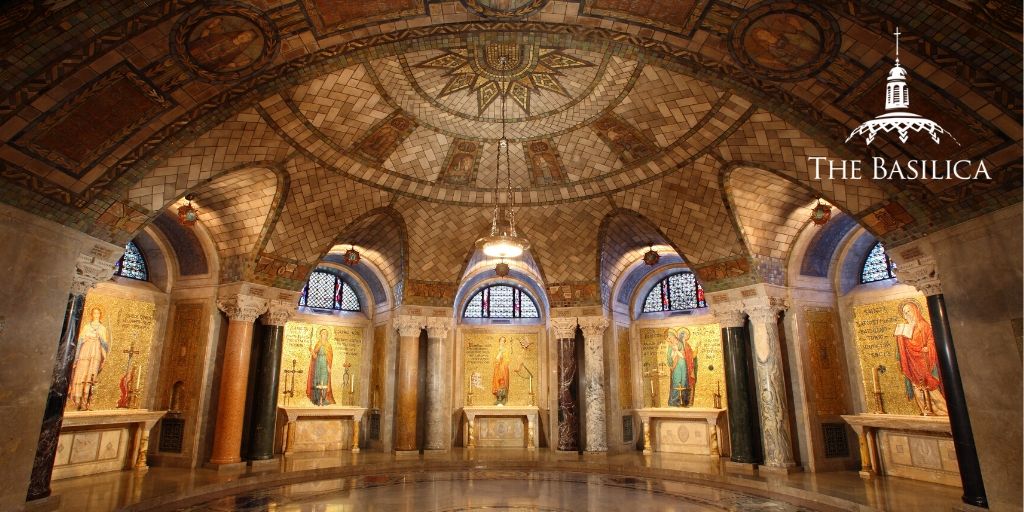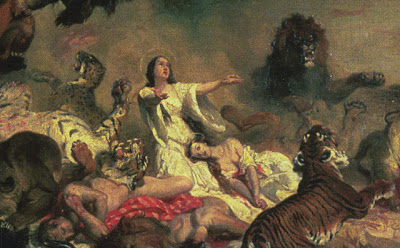Matthew CHAP. 9
9:14–17
14. Then came to him the disciples of John, saying, Why do we and the Pharisees fast oft, but thy disciples fast not?
15. And Jesus said unto them, Can the children of the bridechamber mourn, as long as the bridegroom is with them? but the days will come, when the bridegroom shall be taken from them, and then shall they fast.
16. No man putteth a piece of new cloth unto an old garment, for that which is put in to fill it up taketh from the garment, and the rent is made worse.
17. Neither do men put new wine into old bottles; else the bottles break, and the wine runneth out, and the bottles perish: but they put new wine into new bottles, and both are preserved.
GLOSS. (ap. Anselm.) When He had replied to them respecting eating and converse with sinners, they next assault Him on the matter of food; Then came to him the disciples of John, saying, Why do we and the Pharisees fast often, but thy disciples fast not?
JEROME. O boastful enquiry and ostentation of fasting much to be blamed, nor can John’s disciples be excused for their taking part with the Pharisees who they knew had been condemned by John, and for bringing a false accusation against Him whom they knew their master had preached.
CHRYSOSTOM. What they say comes to this, Be it that you do this as Physician of souls, but why do your disciples neglect fasting and approach such tables? And to augment the weight of their charge by comparison, they put themselves first, and then the Pharisees. They fasted as they learnt out of the Law, as the Pharisee spoke, I fast twice in the week; (Luke 18:12.) the others learnt it of John.
RABANUS. For John drank neither wine, nor strong drink, increasing his merit by abstinence, because he had no power over nature. But the Lord who has power to forgive sins, why should He shun sinners that eat, since He has power to make them more righteous than those that eat not? Yet doth Christ fast, that you should not avoid the command; but He eats with sinners that you may know His grace and power.
AUGUSTINE. (ubi sup.) Though Matthew mentions only the disciples of John as having made this enquiry, the words of Mark rather seem to imply that some other persons spoke of others, that is, the guests spoke concerning the disciples of John and the Pharisees—this is still more evident from Luke; why then does Matthew here say, Then came unto him the disciples of John, (Luck 5:33.) unless that they were there among other guests, all of whom with one consent put this objection to Him?
CHRYSOSTOM. Or; Luke relates that the Pharisees, but Matthew that the disciples of John, said thus, because the Pharisees had taken them with them to ask the question, as they afterwards did the Herodians. Observe how when strangers, as before the Publicans, were to be defended, He accuses heavily those that blamed them; but when they brought a charge against His disciples, He makes answer with mildness. And Jesus saith unto them, Can the children of the bridegroom mourn as long as the bridegroom is with them? Before He had styled Himself Physician, now Bridegroom, calling to mind the words of John which he had said, He that hath the bride is the bridegroom. (John 3:29.)
JEROME. Christ is the Bridegroom and the Church the Bride. Of this spiritual union the Apostles were born; they cannot mourn so long as they see the Bridegroom in the chamber with the Bride. But when the nuptials are past, and the time of passion and resurrection is come, then shall the children of the Bridegroom fast. The days shall come when the bridegroom shall be taken from them, and then shall they fast.
CHRYSOSTOM. He means this; The present is a time of joy and rejoicing; sorrow is therefore not to be now brought forward; and fasting is naturally grievous, and to all those that are yet weak; for to those that seek to contemplate wisdom, it is pleasant; He therefore speaks here according to the former opinion. He also shews that this they did was not of gluttony, but of a certain dispensation.
JEROME. Hence some think that a fast ought to follow the forty days of Passion, although the day of Pentecost and the coming of the Holy Spirit immediately bring back our joy and festival. From this text accordingly, Montanus, Prisca, and Maximilla enjoin a forty days’ abstinence after Pentecost, but it is the use of the Church to come to the Lord’s passion and resurrection through humiliation of the flesh, that by carnal abstinence we may better be prepared for spiritual fulness.
CHRYSOSTOM. Here again He confirms what He has said by examples of common things; No man putteth a patch of undressed cloth into an old garment; for it taketh away its wholeness from, the garment, and the rent is made worse; which is to say, My disciples are not yet become strong, but have need of much consideration; they are not yet renewed by the Spirit. On men in such a state it is not behoveful to lay a burden of precepts. Herein He establishes a rule for His disciples, that they should receive with leniency disciples from out of the whole world.
REMIGIUS. By the old garment He means His disciples, who had not yet been renewed in all things. The patch of undressed, that is, of new cloth, means the new grace, that is, the Gospel doctrine, of which fasting is a portion; and it was not meet that the stricter ordinances of fasting should be entrusted to them, lest they should be broken down by their severity, and forfeit that faith which they had; as He adds, It taketh its wholeness from the garment, and the rent is made worse.
GLOSS. (ap. Anselm.) As much as to say, An undressed patch, that is, a new one, ought not to be put into an old garment, because it often takes away from the garment its wholeness, that is, its perfection, and then the rent is made worse. For a heavy burden laid on one that is untrained often destroys that good which was in him before.
REMIGIUS. After two comparisons made, that of the wedding, and that of the undressed cloth, He adds a third concerning wine skins; Neither do men put new wine into old skins. By the old skins He means His disciples, who were not yet perfectly renewed. The new wine is the fulness of the Holy Spirit, and the depths of the heavenly mysteries, which His disciples could not then bear; but after the resurrection they became as new skins, and were filled with new wine when they received the Holy Spirit into their hearts. Whence also some said, These men are full of new wine. (Acts 2:13.)
CHRYSOSTOM. Herein He also shews us the cause of those condescending words which He often addressed to them because of their weakness.
JEROME. Otherwise; By the old garment, and old skins, we must understand the Scribes and Pharisees; and by the piece of new cloth, and new wine, the Gospel precepts, which the Jews were not able to bear; so the rent was made worse. Something such the Galatians sought to do, to mix the precepts of the Law with the Gospel, and to put new wine into old skins. The word of the Gospel is therefore to be poured into the Apostles, rather than into the Scribes and Pharisees, who, corrupted by the traditions of the elders, were unable to preserve the purity of Christ’s precepts.
GLOSS. (non occ.) This shews that the Apostles being hereafter to be replenished with newness of grace, ought not now to be bound to the old observances.
AUGUSTINE. (Serm. 210. 3.) Otherwise; Every one who rightly fasts, either humbles his soul in the groaning of prayer, and bodily chastisement, or suspends the motion of carnal desire by the joys of spiritual meditation. And the Lord here makes answer respecting both kinds of fasting; concerning the first, which is in humiliation of soul, He says, The children of the bridegroom cannot mourn. Of the other which has a feast of the Spirit, He next speaks, where He says, No man putteth a patch of undressed cloth. Then we must mourn because the Bridegroom is taken away from us. And we rightly mourn if we burn with desire of Him. Blessed they to whom it was granted before His passion to have Him present with them, to enquire of Him what they would, to hear what they ought to hear. Those days the fathers before His coming sought to see, and saw them not, because they were placed in another dispensation, one in which He was proclaimed as coming, not one in which He was heard as present. For in us was fulfilled that He speaks of, The days shall come when ye shall desire to see one of these days, and shall not be able. (Luke 17:22.) Who then will not mourn this? Who will not say, My tears have been my meat day and night, while they daily say unto me, Where is now thy God? (Ps. 42:3.) With reason then did the Apostle seek to die and to be with Christ.
AUGUSTINE. (De Cons. Ev. ii. 27.) That Matthew writes here mourn, where Mark and Luke write fast, shews that the Lord spake of that kind of fasting which pertains to humbling one’s self in chastisement; as in the following comparisons He may be supposed to have spoken of the other kind which pertains to the joy of a mind wrapt in spiritual thoughts, and therefore averted from the food of the body; shewing that those who are occupied about the body, and owing to this retain their former desires, are not fit for this kind of fasting.
HILARY. Figuratively; This His answer, that while the Bridegroom was present with them, His disciples needed not to fast, teaches us the joy of His presence, and the sacrament of the holy food, which none shall lack, while He is present, that is, while one keeps Christ in the eye of the mind. He says, they shall fast when He is taken away from them, because all who do not believe that Christ is risen, shall not have the food of life. For in the faith of the resurrection the sacrament of the heavenly bread is received.
JEROME. Or; When He has departed from us for our sins, then is a fast to be proclaimed, then is mourning to be put on.
HILARY. By these examples He shews that neither our souls nor bodies, being so weakened by inveteracy of sin, are capable of the sacraments of the new grace.
RABANUS. The different comparisons all refer to the same thing, and yet are they different; the garment by which we are covered abroad signifies our good works, which we perform when we are abroad; the wine with which we are refreshed within is the fervor of faith and charity, which creates us anew within.
Catena Aurea Matthew 9





